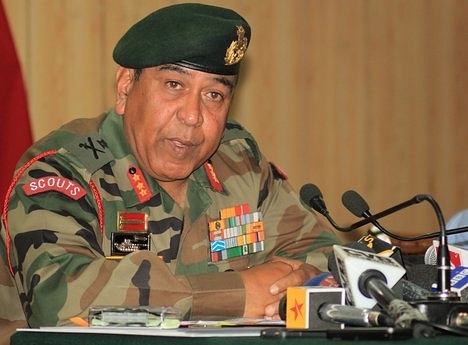Featured
'Hearts Doctrine’ - General Headed To J&K Raj Bhawan

The appointment of Lt. Gen. Syed Ata Hasnain, a former commander of the XV Corps based in Srinagar, and now Visiting Fellow at the Vivekananda International Foundation, as J&K governor is crucial in an election year.
The sensitive border state of Jammu and Kashmir will likely see a new Governor. Word is that Lt General (retired) Syed Ata Hasnain is likely to go to the Raj Bhawan in Srinagar/Jammu. General Hasnain, formerly the Indian Army’s Military Secretary and earlier the commander of the XV Corps based in Srinagar, is currently Visiting Fellow at the Vivekananda International Foundation, the conservative New Delhi-based think-tank whose founder (and former director) Ajit Doval is India’s National Security Adviser (NSA).
Importantly, General Hasnain will have to take charge of the State when its assembly election is held. This is because the election, due by the end of the year, will inevitably have to be pushed back to next Spring due to the once-in-a-lifetime floods which have ravaged the state and whose damage assessment is yet to commence.
The placing of J&K under Governor’s Rule will no doubt spark controversy, as the ruling National Conference (NC) and its chief minister, Omar Abdullah, will kick up a fuss. And while Governor’s Rule may suit Prime Minister Narendra Modi and BJP president Amit Shah – who have set their most ambitious electoral target (after the 2014 Lok Sabha poll) in J&K with Mission-44, in which they hope to unprecedentedly form a BJP government in India’s only Muslim-majority state – it cannot be helped due to the utter destruction wreaked in the State, particularly in the Kashmir Valley.
According to a former legislator in Srinagar, estimates of the internally displaced hover around 15 lakh, and about four decades of development has been undone – at which rate Kashmir would be in as poor shape as Pakistan-occupied Kashmir. Residents are still counting the dead. Epidemics have begun to spread. Getting people resettled and rehabilitated will be a major task, particularly with winter – in Kashmir, usually snowy and bitingly cold – just around the corner.
Having J&K under Governor’s Rule would ensure a fair and efficient start to reconstruction, particularly given how the NC has historically based its power on patronage, thus being seen by many Kashmiris as corrupt and inefficient. (Of course, reconstruction will probably dominate the next elected government’s agenda as well.)
The current government has distinguished itself with its total collapse and disappearance when the floods hit, with many NC ministers fleeing to Jammu or Delhi, instead of staying in their constituencies to supervise rescue or relief work. The public was unsurprisingly furious, with some venting their ire on the armed forces rescue teams, despite the dedicated and diligent work of the army.
If the state government’s cowardice becomes a justification to sack the current Governor, N N Vohra, few tears will be shed. Vohra, a former bureaucrat, is serving his second term at Raj Bhawan, despite any lack of achievement; it is a testament to his guile that he was appointed as the Kashmir interlocutor by the previous NDA government, ingratiated himself with the UPA and was appointed Governor, and has so far survived the large-scale gubernatorial changes after Modi assumed office.
General Hasnain, on the other hand, was sent to XV Corps in December 2010, following a hellish summer of stone-pelting in which 107 youngsters died; it remains one of the biggest blots on Omar Abdullah’s record and is one of the reasons the NC drew a blank in the Lok Sabha election, with even his father Dr Farooq Abdullah stunningly losing the Srinagar seat. (The other reason is the tacit tie-up between People’s Democratic Party, led by Mufti Mohd Sayeed, and the BJP.)
General Hasnain instituted a “Hearts Doctrine” which increased the interactions between the army and the civilians, and came to be known as a different kind of soldier. However, he had a famous acid exchange with the chief minister at a meeting of the unified command in November 2011; Omar had been advocating the repeal of the Armed Forces Special Powers Act (AFSPA) from peaceful districts, but the Corps Commander rhetorically contended that doing so would force India to grant Kashmir independence by 2016. He further added that only the ISI, terrorists and separatists wanted AFSPA repealed, prompting Omar to wonder whether General Hasnain was calling him anti-national.
General Hasnain has also, since retirement in June 2013, has also been active in the Indo-Pak track-II circuit. In a June meeting in Thailand, he engaged in relentless Pakistan-bashing, and used his Muslim identity as a rhetorical weapon.
The government expects that in the time between the floods and the election, Pakistan’s Inter-Services Intelligence (ISI) Directorate will try and raise the temperature in the Valley, given the vulnerability caused by the natural disaster. Hence a former soldier in Raj Bhawan is the preferred choice of New Delhi, at the moment.
Support Swarajya's 50 Ground Reports Project & Sponsor A Story
Every general election Swarajya does a 50 ground reports project.
Aimed only at serious readers and those who appreciate the nuances of political undercurrents, the project provides a sense of India's electoral landscape. As you know, these reports are produced after considerable investment of travel, time and effort on the ground.
This time too we've kicked off the project in style and have covered over 30 constituencies already. If you're someone who appreciates such work and have enjoyed our coverage please consider sponsoring a ground report for just Rs 2999 to Rs 19,999 - it goes a long way in helping us produce more quality reportage.
You can also back this project by becoming a subscriber for as little as Rs 999 - so do click on this links and choose a plan that suits you and back us.
Click below to contribute.
Latest